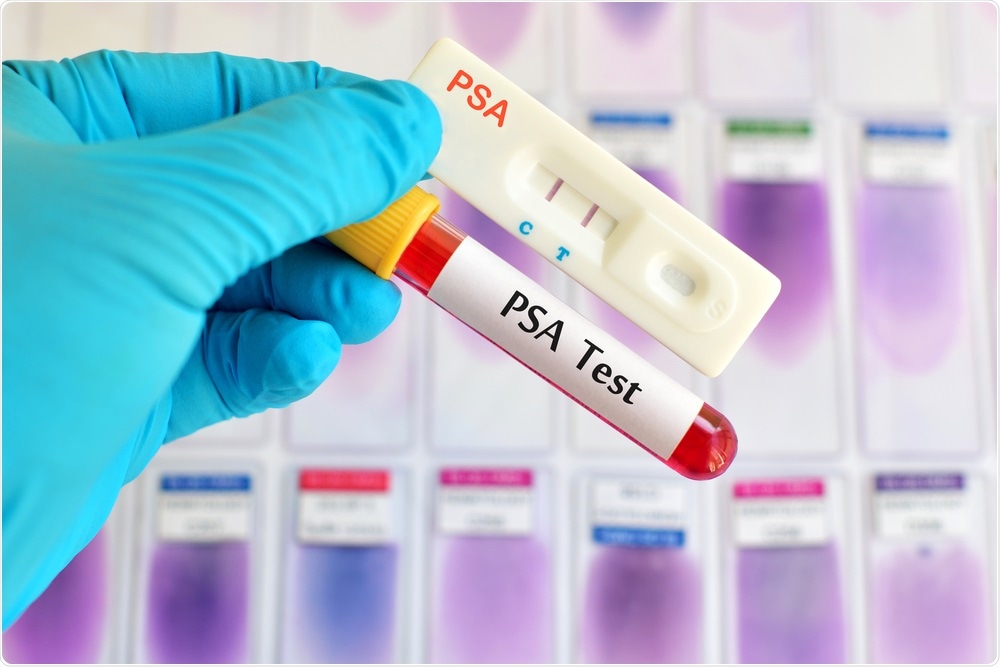The John van Geest Cancer Research Centre at Nottingham Trent University works closely with several prostate cancer support groups and a common theme raised was the process of having to provide tissue for analysis (prostate biopsy) and the difficulty in getting a definitive diagnosis.
Current tests for prostate cancer are not 100% accurate and so there is a possibility to over-diagnose and under-diagnose prostate cancer. It is essential that men with low-risk prostate abnormalities are not diagnosed as having prostate cancer, as those with low-risk/grade disease do not require active treatment.
Furthermore, unnecessarily labeling men as having prostate cancer can assign these men to life-long surveillance and have significant psychological, quality of life, financial, and societal consequences.
We, therefore, embarked on a program to see if we could reliably detect prostate cancer based on a simple blood test.

Image Credit: Kateryna Kon/Shutterstock.com
Why is prostate cancer the most common cancer amongst men?
Overall, prostate cancer is the second most commonly occurring cancer in men, is the most commonly diagnosed cancer in the UK, and the fourth most commonly occurring cancer overall. In the UK, about 1 in 8 men will get prostate cancer in their lifetime.
‘Prostate cancer mainly affects men over 50, with the risk increases with age and a family history of prostate cancer. The risk is even higher for Black African Caribbean men who are 3 times more likely to get the disease - 1 in 4 Black African Caribbean men will get prostate cancer in their lifetime. These men are also more likely to present with prostate cancer at an earlier age (approximately 5 years younger than white British men) and to die from the disease.’
https://prostatecanceruk.org/prostate-information/are-you-at-risk
What current methods are available for the detection of prostate cancer and what are their limitations regarding PSA levels?
The most widely used diagnostic test currently available measures the blood level of a protein called Prostate-Specific Antigen (PSA for short).
Heightened amounts of PSA may mean that the patient has cancer, but 15% of individuals with prostate cancer have normal levels of the protein, and many healthy people can have high amounts of PSA. This blood test is therefore not widely accepted as a reliable diagnostic tool.
Other methods exist to detect prostate cancer, but they are not always accurate. A small piece of the prostate can be taken for analysis, but results from this invasive procedure are often incorrect. Although interest in the potential diagnostic capabilities of MRI scanning is developing, MRI cannot currently be used as a sole diagnostic because a positive MRI can be incorrect in approximately 25% (1 in 4) of cases and a negative MRI can be incorrect in approximately 20% (1 in 5) of cases.
Scans can, therefore, help to spot a tumor, but they are not accurate enough to be conclusive on their own. New tests are therefore urgently needed.

Image Credit: Jarun Ontakrai/Shutterstock.com
Why is it not only important to detect the presence of prostate cancer, but also identify the stage that it is at?
The clinical challenge in prostate cancer diagnosis resides in distinguishing men with low- or small volume intermediate-risk prostate cancer which is unlikely to progress (both require 'active surveillance') from men with an intermediate disease which is likely to progress or with high-risk disease (both of which require treatment).
Some prostate cancer grows too slowly to cause any problems or affect how long you live. Because of this, many men with prostate cancer will never need any treatment. However, some prostate cancer grows quickly and is more likely to spread. This is more likely to cause problems and needs treatment to stop it from spreading.
Recent findings from a decade-long study involving 415,000 British men (The Cluster Randomized Trial of PSA Testing for Prostate Cancer (CAP) Randomized Clinical Trial) have not supported single PSA testing for population-based screening and suggest that asymptomatic men should not be routinely tested to avoid unnecessary anxiety and treatment. It is therefore essential that new approaches for enabling more definitive, early detection of prostate cancer are developed.
Can you describe your research that led to the discovery of your new blood test? How did you incorporate computational models in your research?
The John van Geest Cancer Research Centre at Nottingham Trent University has expertise in monitoring immune responses, and we felt that we could use this approach for detecting the presence of cancer. We know that there is a two-way relationship between cancer and the immune system and that the immune system has the potential to recognise cancer, We therefore postulated that the presence of cancer will trigger changes in the biology/appearance of white blood (immune cells) that can be detected in the blood.
However, ‘standard’ statistical tests could not detect differences in the profiles of white blood (immune) cells in the blood of patients with prostate cancer and men without prostate cancer.
We, therefore, turned to more complex computational models. Our model uses data from blood tests and artificial intelligence-based computing (machine learning) to detect the presence of prostate cancer more accurately.
The tool has two elements, the first detects whether a man has prostate cancer. If prostate cancer is detected, the second element will detect the clinical risk of the disease (low, intermediate, high) and thereby enable the clinician to decide whether the patient requires no further investigation/treatment (‘watch and wait’) or whether further investigation and treatment are required
How does this test work?
This test works by analyzing the biology of immune cells known as natural killer (NK) cells in the blood. NK cells are the first line of attack against cancer and so are likely to be influenced by the presence of cancer.
The data from the analysis are then analyzed using the computational model that predicts whether cancer is there and, if so, its severity.

Image Credit: Alpha Tauri 3D Graphics/Shutterstock.com
How could the new test you have developed help to reduce the numbers of invasive biopsies? Do you believe this could also limit the psychological impact these biopsies have on men?
The studies have focused on asymptomatic men with PSA levels lower than 20 ng/ml, as men with PSA levels higher than 20 ng/ml are more likely to have prostate cancer and are thereby less likely to pose a clinical diagnostic quandary.
In contrast, men with a PSA lower than 20 ng/ml pose a major problem because although only 30–40% of these men will have prostate cancer, all currently undergo potentially unnecessary invasive prostate biopsies to determine who has the disease.
It is, therefore, this group of men for which the development of new and more accurate approaches for the early detection of cancer is a clear unmet clinical need, and for whom the benefits of such an approach will be most relevant and significant.
The novelty of this approach is that it interrogates the immunological response to the tumor, not the tumor itself and that it requires a simple blood test (liquid biopsy). Based on current practice, we expect that this approach could avoid up to 70% of prostate biopsies, thereby sparing men with a benign prostate disease or low-risk prostate cancer from unnecessary invasive procedures with which are associated significant side-effects.
Do you believe that this test could help to potentially limit the number of men dying from prostate cancer?
The test has the potential to identify high-risk prostate cancer at an early stage in asymptomatic men having moderately elevated PSA levels and so has the potential to reduce the number of men dying from prostate cancer.
When will this test be readily available for use?
We need to obtain the necessary funding to prove the capacity of the test to accurately diagnose prostate cancer in a much larger number of patients – a crucial step to enable critical clinical decisions to be made based on results that it generates. If funding is received, then it is possible that the test could enter into formal clinical trials in 3-4 years.

Image Credit: Monkey Business Images/Shutterstock.com
What are the next steps in your research?
The test is at the ‘experimental’ stage. We now need to validate the approach in a prospective (forward-looking) Clinical Trial in a larger number of men to demonstrate its effectiveness and get approval for it to be used to make important clinical decisions.
We are currently trying to obtain funding for such a trial.
Where can readers find more information?
About Professor Pockley
Professor Pockley is Professor of Immunobiology at Nottingham Trent University and Director of the John van Geest Cancer Research Centre. Research in the Centre focuses on the discovery and application of new cancer biomarkers for detecting cancer, monitoring disease progression, and developing new immunotherapeutic approaches. Progress in these areas is based on a fundamental understanding of cancer cell biology and immunobiology.
Having obtained a Doctor of Philosophy for studies investigating the immunomodulatory properties of human placental protein 14 from Sheffield City Polytechnic (now Sheffield Hallam University) in 1988, Professor Pockley undertook a 2-year postdoctoral fellowship studying ocular mucosal immunoregulation in the Department of Immunology and Microbiology at Wayne State University, Detroit, USA.
In January 1990, he returned to the UK to take up a Lectureship and direct the experimental transplantation program in the Professorial Surgical Unit at the Medical College of St. Bartholomew´s Hospital, London. He returned to Sheffield as a Lecturer at the University of Sheffield Medical School in September 1994, where he was promoted to Reader in Immunobiology in 1996 and Professor of Immunobiology in 2004.
Professor Pockley became the Associate Director of the John van Geest Cancer Research Centre at Nottingham Trent University on 1 May 2012 and its Director in September 2016. He retains an Honorary Professorship in the Department of Oncology and Metabolism at The University of Sheffield (2012 - present).
Professor Pockley has published over 200 articles and in 2019 PLOS Biology1 identified him as being in the top 0.5% (in terms of citation impact) of the ~6.9 million scientists that have published at least 5 papers since 1995 across all disciplines.